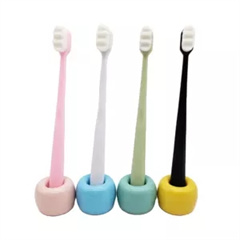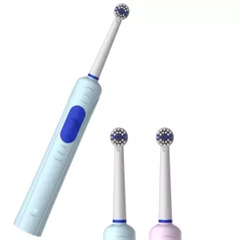**1. ** Prevention of Cavities: Brushing removes food particles and bacteria that can lead to the formation of plaque. If not removed, plaque can erode tooth enamel, leading to cavities.
**2. ** Gum Health: Regular brushing helps prevent gum disease (gingivitis and periodontitis) by removing plaque and bacteria that can cause inflammation and infection of the gums.
**3. ** Fresh Breath: Brushing removes the bacteria that produce foul-smelling compounds, helping to keep breath fresh.
**4. ** Prevention of Tooth Decay: Proper brushing helps remove sugars and acids from food that can weaken tooth enamel and lead to decay.
**5. ** Overall Health Connection: Poor oral hygiene has been linked to various health issues, including cardiovascular disease, diabetes, and respiratory infections. Regular brushing can contribute to overall well-being.
**6. ** Prevention of Plaque Buildup: Plaque buildup can harden into tartar (calculus), which can only be removed by a dentist. Brushing helps prevent the formation of tartar.
**7. ** Maintaining Whiter Teeth: Brushing helps remove surface stains and prevents the buildup of substances that can discolor teeth.
**8. ** Preventing Tooth Sensitivity: Good oral hygiene can help prevent tooth sensitivity by protecting the tooth enamel from erosion and damage.
**9. ** Early Detection of Oral Issues: Regular brushing provides an opportunity to notice any changes in the mouth, such as bleeding gums or unusual spots, which might indicate a need for dental attention.
**10. ** Promoting Healthy Habits: Teaching kids to brush regularly sets a foundation for lifelong oral hygiene habits.
**11. ** Reducing Dental Expenses: By maintaining proper oral hygiene, you can reduce the risk of developing major dental problems that might require costly treatments.
**12. ** Boosting Self-Confidence: A healthy smile contributes to a positive self-image, helping individuals feel confident and comfortable.
**13. ** Preserving Natural Teeth: Regular brushing, along with proper oral care, can extend the life of your natural teeth and reduce the likelihood of tooth loss.
**14. ** Setting an Example: Modeling good oral hygiene practices encourages children and others around you to prioritize their dental health.
Incorporating proper brushing techniques, using fluoride toothpaste, and brushing at least twice a day for about two minutes each time are crucial for reaping the benefits of toothbrushing. Regular visits to the dentist complement these efforts, ensuring that your oral health remains at its best.








